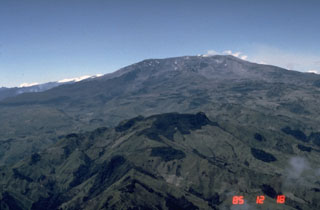Report on Nevado del Ruiz (Colombia) — 26 March-1 April 2025
Smithsonian Institution / US Geological Survey
Weekly Volcanic Activity Report, 26 March-1 April 2025
Managing Editor: Sally Sennert.
Please cite this report as:
Global Volcanism Program, 2025. Report on Nevado del Ruiz (Colombia) (Sennert, S, ed.). Weekly Volcanic Activity Report, 26 March-1 April 2025. Smithsonian Institution and US Geological Survey.
Nevado del Ruiz
Colombia
4.892°N, 75.324°W; summit elev. 5279 m
All times are local (unless otherwise noted)
The Servicio Geológico Colombiano’s (SGC) Observatorio Vulcanológico y Sismológico de Manizales reported that eruptive activity at Nevado del Ruiz continued during 25-31 March. Seismic data indicated that events associated with fluid movement decreased in both number and intensity compared to the previous week, though long-duration signals slightly increased. Some of the seismic events were associated with pulsating ash emissions; webcam images confirmed these ash emissions, including some with higher-temperature ejecta. Gas plumes rose as high as 1 km above the summit; at 1744 on 25 March a gas-and-ash plume rose as high as 1.9 km above the summit as it drifted SW and W. Seismicity associated with rock fracturing decreased in both number and magnitude compared to the previous week. The earthquakes were mainly located below Arenas Crater, the NE and SW flanks within 4 km, and the W and NW flanks within 14 km, with depths of 1-10 km. Low-energy thermal anomalies on the crater floor were identified in satellite data. Sulfur dioxide emissions detected in satellite data continued to be significant. The Alert Level remained at Yellow (the second level on a four-level scale), and the public was warned to stay out of the restricted areas around Arenas Crater, not to spend long periods of time on the Murillo-Cerro Gualí Road, and to avoid drainages in the high-threat zones.
Geological Summary. Nevado del Ruiz is a broad, glacier-covered volcano in central Colombia that covers more than 200 km2. Three major edifices, composed of andesitic and dacitic lavas and andesitic pyroclastics, have been constructed since the beginning of the Pleistocene. The modern cone consists of a broad cluster of lava domes built within the caldera of an older edifice. The 1-km-wide, 240-m-deep Arenas crater occupies the summit. The prominent La Olleta pyroclastic cone located on the SW flank may also have been active in historical time. Steep headwalls of massive landslides cut the flanks. Melting of its summit icecap during historical eruptions, which date back to the 16th century, has resulted in devastating lahars, including one in 1985 that was South America's deadliest eruption.

